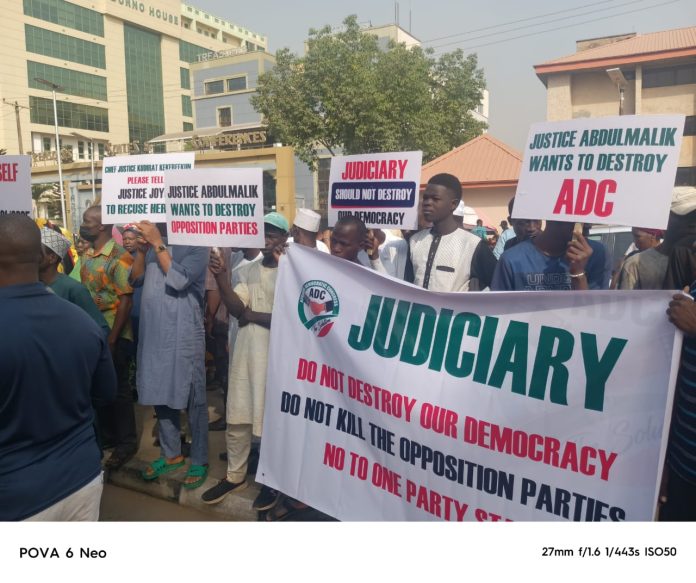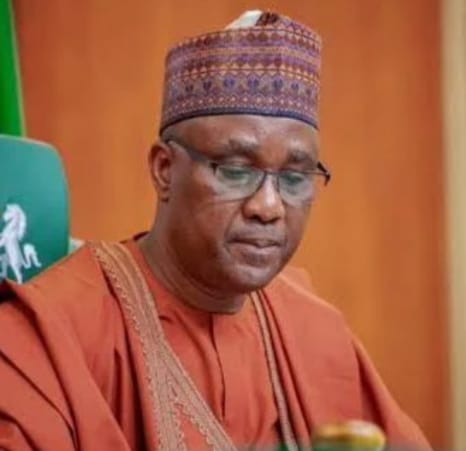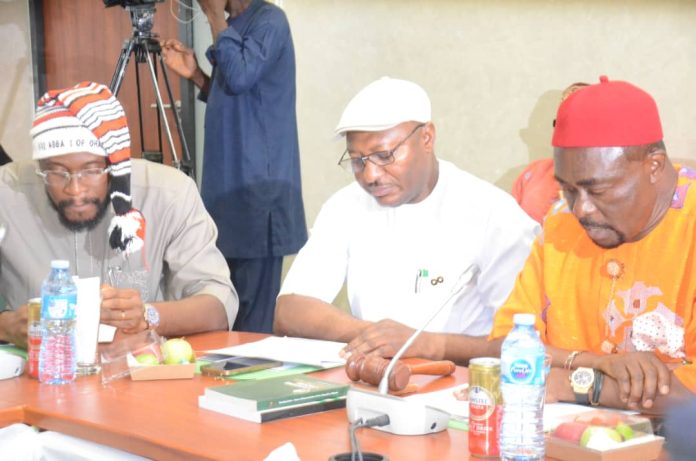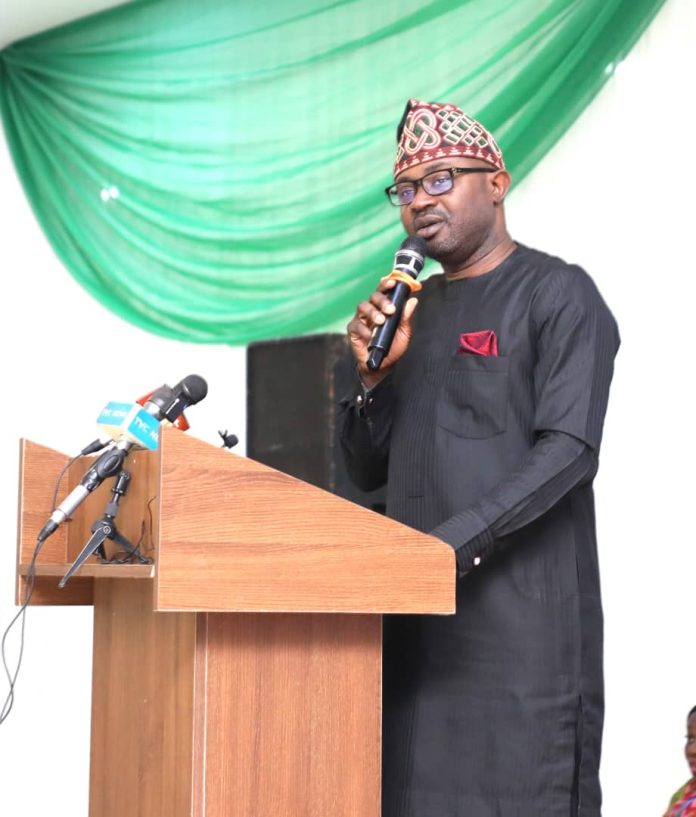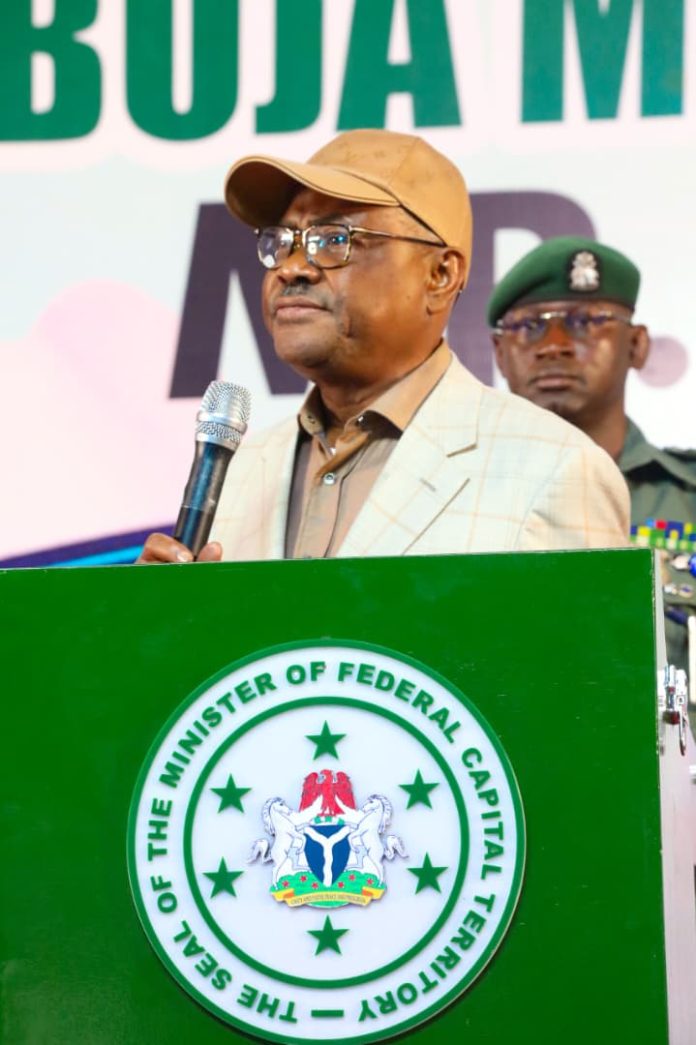At least dozens of civilians, soldiers, and terrorists were killed, and over 100 people abducted when armed Boko Haram/ISWAP fighters attacked **Ngoshe Borno last Tuesday, Senator Mohammed Ali Ndume has confirmed.
Speaking on Thursday, Ndume condemned the assault, commiserated with victims’ families, and called for intensified military operations in **Sambisa Forests the **Mandara Mountains Task Force North East under Operation HADIN KAI, but the attack left the Chief Imam, community elders, and soldiers among the dead. Thousands of civilians, mainly women and children, have been displaced to PulkaBola Ahmed Tinubu to equip security agencies with fighter jets, Mine-Resistant Ambush Protected (MRAP) vehicles, and other technological weapons to strengthen Nigeria’s counter-terrorism efforts. He lamented that frontline troops are currently under-equipped against insurgents wielding RPGs, anti-aircraft guns, and drones.
The Senator praised the Borno State government under Governor Babagana Zulum for their support and efforts to resettle internally displaced persons (IDPs) in liberated communities.
Meanwhile, a joint appeal by the Gwoza Youth Forum sought urgent humanitarian support for displaced Ngoshe residents. Chairman Mal. Idrissa Hamman and Secretary Engr. Aliyu Shehu requested essentials including food, clothes, blankets, and household items to aid the victims currently living under dire conditions in Pulka.
Senator Ndume reiterated that ongoing counter-terrorism operations, including Operation DESERT SANITY V, must be sustained and strengthened to eliminate Boko Haram/ISWAP threats in the North East.
ADC Supporters Besiege Abuja Court, Demand Judge’s Recusal Over Alleged Bias
Tension mounted at the Federal High Court in Abuja on Thursday as supporters and registered members of the African Democratic Congress (ADC) staged a peaceful protest demanding that Justice Joyce Abdulmalik step down from handling cases involving the party and other opposition groups.
Operating under the banner of ADC Registered Members and Stakeholders (ADC–RM & S), the protesters also petitioned the Nigerian Bar Association (NBA) and the Supreme Court of Nigeria leadership, urging the Chief Justice of Nigeria to intervene and reassign the case to another judge to preserve public confidence in the judicial process.
The protest took place ahead of a scheduled hearing of an ADC-related matter before Justice Abdulmalik.
Addressing journalists during the protest, National President of ADC–RM & S, Anthony Olah, called on the leadership of the judiciary to take urgent steps to protect the integrity of the court process.
“We call on the Chief Justice of Nigeria to direct Justice Joyce Abdulmalik to recuse herself from ADC and other opposition party cases in order to safeguard Nigeria’s democracy from what we see as judicial manipulation,” Olah said.
The protesters also appealed to Nigerians, the international community, and advocates of democratic values to demand fairness in the judicial process as the ADC case comes up again in court.
During the demonstration, participants carried placards bearing inscriptions such as “Judiciary Should Not Destroy Our Democracy,” “Recuse Yourself, We Have No Confidence in You,” among others.
Also speaking, Deputy National Secretary of the ADC, Oladimeji Fabian, alleged that the conduct of proceedings had raised concerns among party members about the fairness of the case.
He cited past instances where judges stepped aside from cases after parties raised concerns over impartiality, including former President of the Court of Appeal, Zainab Bulkachuwa, and Binta Nyako, who both recused themselves from matters to preserve public confidence in the judiciary.
Fabian also referenced an earlier development in the case when Justice Emeka Nwite Omotosho reportedly stepped down after concerns were raised by a party involved in the proceedings.
The demonstrators maintained that their protest was peaceful and aimed solely at drawing attention to what they described as the need for transparency and fairness in judicial proceedings involving political parties.
They further appealed to security agencies to maintain order around the court premises ahead of the next hearing while urging judicial authorities to address their concerns in order to strengthen public trust in Nigeria’s democratic institutions.
Gas Shortage Hits Power Supply as Generation Crashes to 3,940MW
Electricity generation on Nigeria’s national grid dropped sharply on Thursday to 3,940 megawatts (MW) as gas supply shortages forced several thermal power plants to scale down operations.
The Nigerian Independent System Operator (NISO) blamed the development on persistent constraints in gas supply to power generating companies.
In a statement issued in Abuja, NISO said total electricity generation stood at 3,940.53MW as at 05:00 hours on March 5, 2026, already below expected capacity due to ongoing gas supply limitations affecting a number of generating stations.
The situation worsened between 06:00 and 08:00 hours, when several generating units were forced to shut down due to inadequate gas supply to thermal plants.
According to the operator, the shutdown of the affected units resulted in a cumulative loss of about 292MW on the national grid within the two-hour period.
NISO disclosed that operational data as of March 4 showed that thermal power plants across the country require about 1,588.61 million standard cubic feet (MMSCF) of gas per day to operate at optimal capacity.
However, only 652.92 MMSCF of gas was supplied to the plants, representing about 40 per cent of the daily requirement.
The significant shortfall, the operator said, drastically reduced the electricity available for dispatch to the national grid, contributing to the current drop in generation.
“NISO is actively working with the affected Generation Companies and relevant gas suppliers to closely monitor the situation and facilitate the restoration of generation as soon as gas supply to the affected plants stabilises,” the statement said.
The system operator added that it is taking necessary operational measures to maintain stability of the grid while managing the impact of reduced power generation on electricity supply.
Nigeria depends largely on gas-fired thermal power plants for electricity generation, making steady gas supply a critical factor in sustaining power output on the national grid.
NISO assured that it would continue to keep stakeholders and the public informed on developments affecting electricity generation and the overall operation of the power system.
Nigeria Must Tap Carbon Economy Now or Risk $460bn Climate Loss – Abbas
Speaker of the House of Representatives, Tajudeen Abbas, has urged Nigeria to quickly seize the economic opportunities emerging from the global shift to a low-carbon economy, warning that failure to act could cost the country billions of dollars.
Abbas made the call on Thursday at the opening of the National Decarbonisation Technical Roundtable in Abuja, organised by the House Committee on the Mandatory National Decarbonisation Programme. He was represented at the event by Muktar Shagaya.
According to him, climate change is no longer a distant environmental issue but a reality already affecting communities across the country.
“From drought in the North to flooding and erosion in the East, and abnormal rainfall patterns in the South, climate change has become a lived experience for Nigerians,” he said.
Abbas warned that climate inaction could deal a devastating blow to the economy.
“Climate inaction could cost Nigeria up to 30 per cent of its Gross Domestic Product by 2050, equivalent to about $460 billion. As one of Africa’s largest economies, we cannot afford to ignore these risks,” he stressed.
He however clarified that Nigeria’s decarbonisation drive is not intended to weaken the oil and gas sector, which remains a major pillar of the national economy.
Instead, he said the energy transition presents a strategic opportunity for Nigeria to diversify its economy, build competitive green industries and attract new investment aligned with global climate priorities.
Also speaking, Chairman of the House Committee on the Mandatory National Decarbonisation Programme, Sesi Whingan, said the legislative initiative aims to create a comprehensive framework to guide Nigeria’s transition to a low-carbon economy.
He explained that the roundtable marks the start of a structured national engagement designed to build consensus among policymakers, regulators, industry leaders, development partners and civil society organisations.
Whingan noted that the National Assembly of Nigeria has already enacted several laws to support climate and energy transition, including the Climate Change Act 2021, the Electricity Act 2023, the Petroleum Industry Act 2021, and the National Environmental Standards and Regulations Enforcement Agency Act.
He also disclosed that the Federal Government has approved a National Carbon Market Framework expected to generate between $2.5 billion and $3 billion annually over the next decade.
According to him, the framework will establish rules for carbon credit registration, issuance and verification, while encouraging emission-reduction projects in forestry, renewable energy, clean cooking technologies and climate-smart agriculture.
In her remarks, Wangari Muchiri, Director for Africa at the Global Wind Energy Council, said Nigeria’s decarbonisation commitment could unlock major economic benefits.
She noted that sectors such as oil and gas and agriculture in Nigeria are currently carbon-intensive but could become key players in the emerging global carbon economy.
“In today’s global economy, this presents a huge opportunity to capitalise on the carbon economy, create jobs and generate new revenue streams,” she said.
Muchiri added that international partners and private sector stakeholders are ready to support Nigeria’s clean energy transition through financing, knowledge transfer and technical support.
She described the ongoing consultations as crucial for strengthening national engagement on decarbonisation and coordinating action across sectors.
According to her, Nigeria’s push toward decarbonisation could help the country not only mitigate the impact of climate change but also unlock new economic opportunities in the rapidly expanding global carbon market.
SEDC Unveils Bold $200bn Plan to Transform South-East Economy
The South East Development Commission (SEDC) has unveiled an ambitious plan to grow the South-East economy from about $40 billion to $200 billion within the next decade, as part of a sweeping development strategy aimed at boosting investment, infrastructure and regional security.
Managing Director and Chief Executive Officer of the commission, Mark Okoye, disclosed this on Thursday while presenting the commission’s 2026 budget proposal before the House of Representatives Committee on the commission at the National Assembly Complex.
Okoye said the commission’s blueprint is designed to accelerate economic growth through industrialisation, agriculture, technology and the creative economy, while also building critical infrastructure to make the South-East a major investment destination in Africa.
According to him, achieving the ambitious target would require strong collaboration with state governments, the legislature, the private sector and the diaspora community.
“We believe that with the right partnerships and sustained commitment, the South-East economy can expand significantly within the next ten years,” he said.
The SEDC boss also raised concern over environmental degradation in the region, revealing that the South-East currently has more than 2,700 erosion sites, with the cost of fixing a single site estimated between N10 billion and N20 billion.
To drive infrastructure development, Okoye disclosed that the commission plans to capitalise the South-East Investment Company Limited, an investment vehicle aimed at mobilising private sector funding for large-scale projects such as railways, power, ports and gas pipelines.
The company will also undertake feasibility studies and structure bankable projects capable of attracting investors and development partners.
In the area of security, Okoye highlighted the South-East Security Intervention Programme, which aims to create a coordinated security architecture across the five states of the region.
He noted that improving security coordination is critical to creating a stable environment that encourages investment and economic growth.
The commission also plans to establish a Project Preparation Facility to finance feasibility studies, environmental assessments and engineering designs for major infrastructure projects.
On agriculture, Okoye said the commission intends to promote mechanised farming through the establishment of demonstration farms of 200 to 300 hectares across rural communities.
The initiative will support the development of agro-industrial hubs and create aggregation centres to help smallholder farmers market their produce.
Other key programmes captured in the 2026 budget include the South-East Industrialisation Programme, aimed at developing special economic zones to attract manufacturing investments, as well as a Youth Entrepreneurship and Innovation Programme designed to support technology startups and young entrepreneurs.
The commission also plans to invest in grassroots sports infrastructure to nurture young talents and promote national unity.
Responding to the presentation, Chairman of the House Committee on the commission, Chris Nkwonta, commended the SEDC for its detailed submission and acknowledged the progress recorded since its inauguration in February 2025.
“The committee is satisfied with the commission’s performance within its short period of operation,” he said.
The committee subsequently adopted the commission’s N250 billion budget proposal, urging the leadership of the SEDC to sustain the momentum and ensure that the programmes translate into tangible development for the South-East region.
Senate Reopens Probe Into ‘Missing’ N210trn, Summons Kyari, Ajia, Others
The Senate has reopened investigation into an alleged N210 trillion unaccounted expenditure by the Nigerian National Petroleum Company Limited (NNPCL) between 2017 and 2023.
The upper chamber, through its Committee on Public Accounts, has summoned the immediate past Group Chief Executive Officer (GCEO) of NNPCL, Mele Kyari, former Chief Financial Officer, Umar Ajia Isa, and former Group General Manager of NAPIMS, Dr Bala Wunti, to explain the controversial figures contained in audit reports.
The committee also warned that it may issue arrest warrants against any former NNPCL officials who fail to honour the invitation when the date for the hearing is communicated.
Chairman of the committee, Senator Aliyu Wadada Ahmed (Nasarawa West), disclosed this while briefing journalists after the committee’s meeting in Abuja on Thursday.
According to him, the Senate is demanding explanations for N210 trillion made up of N103 trillion and N107 trillion, which auditors reportedly flagged as not properly accounted for in the corporation’s financial records.
Wadada said the summoned officials are expected to appear before the committee alongside the current management of NNPCL, led by the incumbent GCEO, Engineer Bayo Ojulari, as well as all external auditors who handled the company’s accounts within the period under review.
He stated that the committee had resolved that NNPCL must account for the entire N210 trillion, describing the figures as unacceptable based on available audit reports.
“The NNPCL should refund the sum of N210 trillion being the combined figure of N103 trillion and N107 trillion which were not properly accounted for as contained in the audit reports,” Wadada said.
The committee also directed the national oil company to remit all production costs charged against crude oil revenue into the Treasury, noting that NNPC and its subsidiaries, including NAPIMS, do not directly produce crude oil.
Wadada further revealed that the Senate was alarmed by reports that NNPC spent about N5 billion simply to change its name to NNPCL, saying the committee considered the expenditure excessive and unacceptable.
“This to us in the committee is unacceptable and satisfactory explanations must be given,” he added.
He explained that the decision to reopen the probe followed NNPCL’s failure to provide convincing answers to 19 audit queries raised by the committee.
According to him, NNPCL had claimed that the N103 trillion represented cumulative expenses incurred by Joint Venture partners through JV cash calls from 2017, but the committee rejected the explanation.
Similarly, he said the N107 trillion listed as subsidy receivables in the company’s audited financial statement as of December 2023 was also questionable.
“The audited financial statement shows N107 trillion as sundry receivables which NNPCL claims is owed by some banks and other entities. When put together, the company must properly account for N210 trillion,” he said.
The committee, however, reiterated its support for the administration of President Bola Ahmed Tinubu, noting that the probe is part of efforts by the National Assembly to strengthen transparency, accountability and proper management of public funds.
FG Deploys AI Tracking System to Hunt Visa Overstayers, Irregular Migrants
The Federal Government has unveiled plans to deploy an artificial intelligence-driven tracking system to identify and clamp down on irregular migrants and visa overstayers across the country.
Minister of Interior, Olubunmi Tunji-Ojo, disclosed this on Thursday in Abuja during the 2026 Sectoral Performance Review Retreat of the ministry, stating that the government now has access to data covering every traveller who has entered Nigeria in the past decade.
According to the minister, the new system will enable authorities to track individuals who have overstayed their visas as part of efforts to strengthen border security and reposition the Nigeria Immigration Service as a key internal security institution.
He revealed that the immigration service has established an Integrated Operations Centre and a Network Operations Centre, which now provide access to detailed records of travellers entering the country over the last ten years.
“With this system, we can see everyone who has entered Nigeria in the last 10 years — where they came from and their travel details. We know those who have overstayed, and we will go after them with due respect because other countries also enforce their immigration laws,” the minister said.
Tunji-Ojo added that the reform is part of a broader effort to transform the immigration service into “an internal security enabler and a protector and guardian of Nigeria’s border space.”
The minister also tasked the Nigeria Security and Civil Defence Corps (NSCDC) with ensuring that its VIP protection services remain transparent and accessible to all citizens.
According to him, the protection services must be corruption-free so that ordinary Nigerians facing genuine threats can receive protection without needing personal connections within the security establishment.
“VIP protection must be democratized. The son of a nobody must have the same opportunity to be protected if there is a genuine threat,” he said.
Tunji-Ojo further called on the National Identity Management Commission (NIMC) to intensify efforts toward the registration and data capture of all Nigerians, stressing that the country cannot claim success until every citizen is properly captured in the national database.
While addressing officials of the ministry and its agencies, the minister stressed that preparations for the 2027 general elections would not distract the ministry from its core mandate of safeguarding the nation’s internal security.
He warned that there would be consequences for agencies that fail to meet their performance targets, describing the current administration’s approach as an “era of business unusual.”
Tunji-Ojo also highlighted the need for reforms in correctional services, noting that the justice system must prioritize rehabilitation to reduce repeat offences.
“Anybody who goes into correctional custody must be reformed and transformed. The goal is to reach a point where recidivism is close to zero,” he said.
Earlier in her remarks, the Permanent Secretary of the ministry, Dr. Magdalene Ajani, emphasized that effective leadership must be driven by devotion, promises, performance and measurable impact.
CBN Gold Reserves Rise to $3.5bn as Local Bullion Boosts External Assets
Nigeria’s external reserves have climbed to $3.5 billion in gold holdings following the addition of locally refined bullion meeting London Bullion Market Association (LBMA) Good Delivery standards, the Central Bank of Nigeria (CBN) has disclosed.
The latest consignment was aggregated by the Solid Minerals Development Fund (SMDF) under the National Gold Purchase Programme (NGPP) and delivered into the apex bank’s reserves as part of its diversification drive.
Speaking at a workshop on strategies to maximise the economic benefits of minerals in Nigeria, CBN Governor, Olayemi Cardoso, said the monetary-grade gold was purchased in naira at prices linked to LBMA benchmarks.
According to him, the transaction structure enabled the bank to strengthen its gold reserves without deploying foreign exchange, thereby preserving external liquidity while enhancing reserve growth.
Cardoso noted that the move aligns with broader macroeconomic stability objectives, particularly amid global uncertainties, as central banks worldwide increasingly turn to gold as a hedge against inflation and geopolitical risks.
The NGPP sources gold from local miners under a responsible sourcing framework aligned with international due diligence standards. While the CBN acts as the sole off-taker, the SMDF oversees fiscal and supply chain management.
The CBN governor stressed that Nigeria’s mineral wealth can only translate into sustainable economic gains through prudent management, institutional credibility and strict adherence to global best practices.
Executive Secretary of the SMDF, Hajiya Fatima Umaru Shinkafi, described the successful delivery of LBMA-standard gold as proof of strengthened formalisation and due diligence processes within the sector.
Also speaking, President and Chief Executive Officer of the Africa Finance Corporation, Samaila Zubairu, reaffirmed support for mineral sector financing, while Executive Vice Chairman of Kian Smith Gold Company, Nere Emiko, called for deeper investment in exploration and processing infrastructure.
The apex bank maintained that the domestic gold purchase programme remains central to its strategy to enhance reserve quality, reduce external vulnerabilities and position Nigeria’s mineral assets as a pillar of long-term economic stability.


